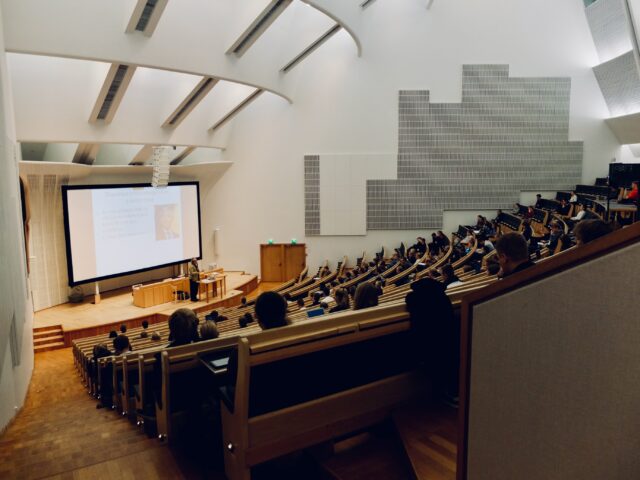Quacquarelli Symonds (QS) has released its World University Rankings for 2024, assessing 1,500 institutions from around the world on their performance in the postsecondary sector. This year, QS changed its methodology by enhancing many of its existing metrics–including Academic Reputation, Employer Reputation, and Faculty Student Ratio–and introducing three new metrics: Sustainability, Employment Outcomes, and International Research Network. Three Canadian universities made the global top 100, including the University of Toronto (#21), McGill University (#30), and the University of British Columbia (#34). Other universities within the top 200 included the University of Alberta (#111), the University of Waterloo (#112), Western University (#114), Université de Montréal (#141), the University of Calgary (#182), and McMaster University (#189).

Top Ten News
June 29, 2023
The University of New Brunswick’s Faculty of Law will soon occupy the renewed Fredericton Justice Building. A $62M investment jointly made by the Government of Canada, Government of New Brunswick, and the University of New Brunswick will fund renovations of the building that will prioritize environmental sustainability, reduce greenhouse gas emissions, and target LEED Gold certification standards. The building will also have new ventilation and communications systems, increased accessibility features, reconfigured spaces, and more. “In this historic and revitalized space, UNB Law will have the ability to attract more students, offer more programs, and have a greater impact in our community,” said UNB President Dr Paul Mazerolle.
The University of Victoria has received almost $1.9M from the Government of Canada to embark on two projects that will help boost innovation and economic growth in British Columbia. $1.2M of this funding will go towards the purchase and installation of a flex mass spectrometer for UVic’s Proteomics Centre. This instrument will support efforts to advance drug development, cancer research, and personalized medicine for disease prevention and treatment. UVic’s Pacific Regional Institute for Marine Energy Discovery will use the remainder of the funding ($658K) to assess marine energy resources for generating electricity on Haida Gwaii. These investments are part of a broader federal investment into ocean technology, life sciences, and clean energy projects in the Greater Victoria region.
The University of Waterloo has approved an investment of up to $5M into the Velocity Fund II (VFII), a for-profit venture capital fund that was recently launched out of UWaterloo’s Velocity incubator. VFII aims to provide early support for software and deeptech startups coming out of the Waterloo region. “The University’s donors have been yearning for the endowment to play a more active role investing in outstanding Waterloo startups, and we’re excited that this investment into the Velocity Fund II could be just the beginning, and at such an opportune point in the economic cycle,” said UWaterloo Finance & Investment Committee Chair Michael Ashmore.
In a recent editorial for the Chronicle of Higher Ed, Andrew Gelman (Columbia University) discusses the possible reasons behind academic fraud. Gelman reflects on a recent case of a researcher who studied cheating and was found to have falsified data. The author writes that those who engage in scientific misconduct are often rewarded by their actions until they are exposed. As the fraud continues, they eventually come to either consider themselves invincible or believe that many of their peers are cheating as well. Gelman asserts that those who are aware of the cheating but stay silent and/or who do not check research when collaborating with others are directly contributing to the problem.
Algonquin College has unveiled a new Bachelor of Commerce (Marketing) Honours program that places a strong emphasis on digital marketing technologies. The program offers three co-operative education work terms, throughout which students will be able to apply their ongoing learning. “This new program prepares learners with a data-driven marketing skillset along with established general business practice knowledge,” said Algonquin President Claude Brulé. “The Bachelor of Commerce (Marketing) Honours degree also provides the opportunity for learners to continue their education at the graduate level.” The program is set to launch this September.
Vancouver Community College has announced its plans for its Broadway campus expansion. This expansion will include the development of an eight-storey Centre for Clean Energy and Automotive Innovation (CCEAI). The building’s lower levels will be designed for public use, while the upper levels will showcase multiple clean energy technologies as part of the future clean energy program at VCC. The college is also looking to capture lost heat from a sewer main that runs near VCC as a low-carbon heating method for the campus.
Maritime Christian College has ended in-person instruction and moved its offerings entirely online. The changes were made in response to dwindling student numbers and in order to allow a diverse range of people from around the world to complete their studies digitally. The college has recently experienced an increase in part-time students, as well as an increasing number of enrolments from as far away as Europe and Africa. The college’s current property has been sold to Gray Group, which plans to redevelop the land to create multi-unit housing for University of Prince Edward Island students.
The Université de Saint-Boniface’s faculty association (APPUSB) has voted in favour of a strike. The vote comes after almost two and a half years of negotiations between the faculty association and USB; professors at the institution have been without a contract since August 2020. Earlier in June, APPUSB rejected USB’s latest pay offer, citing a gap in the two sides’ salary expectations. USB Director of Communications Nathalie Roche stated that while “there is a divergence of perspectives” between the two parties, continuing negotiations will commit “to reaching a fair and reasonable agreement.”
The University of Fredericton has launched a new Artificial Intelligence (AI) Leadership specialty stream in its Master and Executive Master of Business Administration programs. The stream is set to provide students and future managers with the techniques required to grow, scale, and effectively employ AI solutions. “The UFred AI Leadership stream will provide a comprehensive curriculum of AI management techniques so that students can stay ahead of the competition, giving them an edge in terms of leverage AI technology,” said UFred Dean of Academics Michael Hobeck.
